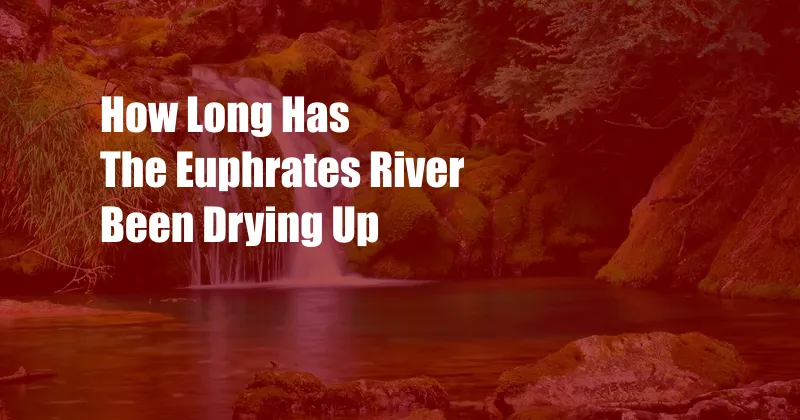
**The Vanishing River: The Fate of the Euphrates**
In the heart of the ancient Middle East, where civilizations flourished and history was etched in stone, there flows a river that has witnessed the rise and fall of empires. The mighty Euphrates, once a lifeline for millions, is now facing an unprecedented crisis, its waters dwindling with each passing year.
My first encounter with the Euphrates was in my childhood, when my family traveled to Iraq. I remember standing on the banks of the river, marveling at its expanse and the gentle current that carried stories from ages past. Today, the river that once inspired awe paints a different picture—a shadow of its former self, its waters receding further with each passing season.
**The Drying River: A Troubling Trend**
Over the past decades, the Euphrates has been steadily drying up, its water levels plummeting to alarming lows. This decline has been attributed to a combination of factors:
- Climate Change: Rising temperatures and altered precipitation patterns have reduced the amount of water reaching the Euphrates from its tributaries.
- Dam Construction: Dams built upstream have disrupted the river’s natural flow and reduced the volume of water flowing into Iraq.
- Increased Water Consumption: Growing populations and agricultural expansion have increased water demand, putting further strain on the Euphrates’ limited resources.
The consequences of the Euphrates’ decline are far-reaching. The river supports millions of people, providing water for drinking, irrigation, and transportation. Its disappearance would have a devastating impact on local communities, agriculture, and the regional economy.
**The History of the Euphrates: A River of Civilization**
The Euphrates River has played a pivotal role in human history for thousands of years. Its fertile banks nurtured the birth of some of the world’s earliest civilizations, including Mesopotamia, Babylonia, and Assyria.
The river was a source of wealth and power, its waters used to irrigate vast agricultural fields and facilitate trade between distant lands. It also served as a natural boundary, dividing and shaping political and cultural landscapes.
**The Euphrates Today: A River in Peril**
Today, the Euphrates River faces multiple threats. In addition to the impacts of climate change and dam construction, the river is also suffering from pollution and water mismanagement. Industrial wastewater, agricultural runoff, and inadequately treated sewage are contaminating the river’s waters, posing a risk to human health and aquatic life.
The Euphrates’ decline has sparked concern among governments, environmentalists, and local communities. Efforts are underway to address the challenges facing the river, including initiatives to improve water management, reduce pollution, and restore the river’s ecological integrity.
**Expert Insights and Tips for Preserving the Euphrates**
Experts emphasize the importance of a comprehensive approach to saving the Euphrates River. Here are some tips based on their insights:
- Reduce water consumption: Implement water conservation measures in agriculture, industry, and households.
- Promote sustainable agriculture: Adopt water-efficient irrigation techniques and reduce the use of fertilizers and pesticides.
- Control pollution: Enforce strict regulations to prevent industrial and agricultural runoff from entering the river.
- Collaborate with neighboring countries: Establish regional agreements to manage water resources and address transboundary issues.
By following these tips and advocating for the river’s preservation, we can help ensure that the Euphrates continues to flow for generations to come.
**FAQs on the Euphrates River**
Q: How long has the Euphrates River been drying up?
A: The Euphrates River has been experiencing a gradual decline in its water levels for several decades, with the rate of decline accelerating in recent years.
Q: What are the main causes of the Euphrates River’s decline?
A: The decline is primarily attributed to climate change, dam construction, and increased water consumption.
Q: What are the consequences of the Euphrates River’s drying up?
A: The decline has severe impacts on local communities, agriculture, and the regional economy. It can also lead to environmental degradation and threaten biodiversity.
Q: What is being done to address the situation?
A: Governments, environmentalists, and local communities are working together to implement water conservation measures, reduce pollution, and restore the river’s ecological integrity.
**Conclusion**
The Euphrates River, once a symbol of life and prosperity, is now facing an uncertain future. The consequences of its decline are dire, but it is not too late to act. By raising awareness, implementing sustainable practices, and advocating for the river’s preservation, we can save the Euphrates and ensure that this ancient waterway continues to nurture life for generations to come.
Do you care about the fate of the Euphrates River? Share your thoughts and join the conversation to protect this precious resource.